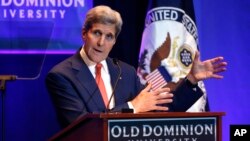The United States will convene a task force to integrate climate and security analysis into foreign policy priorities, weeks ahead of the high-profile Paris climate conference in December.
Secretary of State John Kerry, speaking Tuesday to scientists and students at Old Dominion University in Norfolk, Virginia, said he'd made climate change a priority not just because it's a threat to the environment. “It’s because by fueling extreme weather events, undermining our military readiness and exacerbating conflicts around the world, climate change is a threat to the security of the United States and, indeed, to security and stability everywhere,” he said.
Climate change, Kerry said, is a "threat multiplier."
WATCH: John Kerry Discusses Importance of Studying Climate Change
Barry Rabe, a senior fellow at the Brookings Institution, a Washington research and policy group, said the U.S. task force would elevate climate change to a more visible level in U.S. foreign and military policy considerations.
“It probably means initially a more systematic effort to try to take climate impact and conditions into account when deciding how feasible it is for the U.S. to become involved in various foreign policy issues [and] what challenges American military and services personnel literally might be facing when deployed or stationed abroad,” he said.
Rabe pointed out that Kerry chose to deliver his speech in Norfolk, a coastal urban area vulnerable to rising sea levels and the home of what Kerry said is the nation’s largest naval base. Also, a pilot project on climate change and sea level rise is based at Old Dominion.
The Obama administration’s policy on climate change faces opposition at home from the Republicans. President Barack Obama’s recent decision to block the Keystone XL pipeline has triggered criticism that he’s backing environmental extremism over jobs.
Top Republican lawmakers are also challenging the legitimacy of Obama’s attempts to craft a global agreement.
The Obama administration is laying the groundwork to promote greater multinational cooperation at the Paris conference. Days ago, the U.S. joined other nations on an agreement to reduce production and use of hydrofluorocarbons, used primarily in air conditioning and refrigeration but also considered to be potent greenhouse gases that play a major role in driving global climate change.
Under the international agreement, the U.S. and others committed to amending in 2016 the Montreal Protocol — an international treaty calling for phasing out production of substances responsible for ozone depletion.
“What the Montreal arrangement has focused on at this point is actually building on an earlier environmental success story,” said Rabe, pointing to successful efforts two decades ago to protect ozone layer by banning the use of some refrigerants and spray can accelerants.
Although climate change did not lead to the rise of terrorist groups such as Boko Haram in Nigeria and the crisis in Syria, said Kerry, it increases the risk of instability, especially in places already undergoing economic, political and social stress.
“Immediately prior to the civil war in Syria, the country experienced its worst drought on record,” he said.
